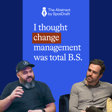
Ep 47: Steering Companies Through Crisis: Chelsea Grayson, Managing Partner at Pivot
How do you build trust with investors who tap you for the CEO role? How do you prepare yourself to lead companies through some of their toughest moments, including bankruptcy, and guide other companies through their transformations as a board member?
Chelsea Grayson, managing partner of corporate restructuring at Pivot > and former CEO and board member of brands like American Apparel, True Religion, and Spark Networks, has steered many ships through rough waters, including post-chapter 11 turnarounds, corporate wind-downs, and firing CEOs for cause. She has transitioned from board member to operator and back again, and is currently sharing her expertise on the boards of Xponential Fitness and Beyond Meat.
Listen as Chelsea discusses her legendary journey from law firm partner to GC, CEO, Board Member, and now managing partner of an all-star corporate restructuring company, and offers tips to lawyers who are looking to find a board seat.
Read detailed summary: https://www.spotdraft.com/podcast/episode-46
Topics:
Introduction: 0:00
Rising to partner at Jones Day and Loeb & Loeb, two big LA-based law firms: 3:00
Transition to in-house legal (and a CEO role) at American Apparel: 9:35
Tips for building relationships with investors: 15:11
Managing CEO transitions: 18:34
Joining boards and positioning yourself as a good board member: 26:30
Becoming CEO of True Religion Jeans during a turnaround: 34:19
Sitting on the board of Sugarf ina after a bankruptcy turnaround: 37:45
Stepping into a tech CEO role at Spark Networks: 42:00
Founding Pivot >, a corporate restructuring company: 47:39
Book recommendations: 55:08
What you wish you’d known as a young lawyer: 58:10
Connect with us:
Chelsea Grayson: https://www.linkedin.com/in/chelseagrayson24/
Tyler Finn: https://www.linkedin.com/in/tylerhfinn
SpotDraft: https://www.linkedin.com/company/spotdraft
SpotDraft is a leading CLM platform that solves your end-to-end contract management issues. Visit https://www.spotdraft.com to learn more.



















